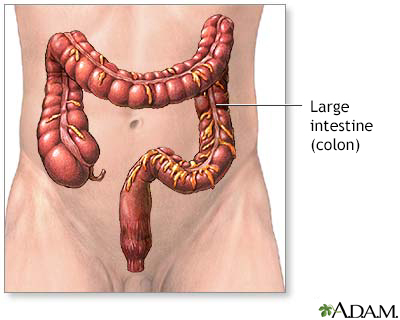Ileostomy - what to ask your doctor
Ostomy - what to ask your doctor; What to ask your doctor about ileostomy or colostomy; Colostomy - what to ask your doctor; Stoma - what to ask your doctor
You have had an operation to create an ileostomy or colostomy. Your ileostomy or colostomy changes the way your body gets rid of waste (stool, feces, or "poop").
You now have an opening in your belly called a stoma. Waste will pass through the stoma into a pouch that collects it. You will need to take care of your stoma and empty the pouch.
If the surgery connects the pouch to the end of the small intestine (ileum) it is called an ileostomy . If it connects the pouch to somewhere in the large intestine, it is called a colostomy.
Below are some questions you may want to ask your health care provider to help you take care of your ileostomy or colostomy.
Images


Questions
Will I be able to wear the same clothes as before?
What will the stool look like that comes from the ileostomy or colostomy? How many times a day will I need to empty it? Should I expect an odor or smell?
Will I be able to travel?
How do I change the pouch?
- How often do I need to change the pouch?
- What supplies do I need, and where can I get them? How much do they cost?
- What is the best way to empty the pouch?
- How do I clean the bag afterward?
Can I take showers? Can I take a bath? Can I swim? Do I need to wear the pouch when I bathe?
Can I still play sports? Can I go back to work?
Can I still have sex?
Do I need to change the medicines I am taking? Will birth control pills still work?
What changes do I need to make in my diet?
What can I do if my stools are too loose? Are there foods that will make my stools more firm?
What can I do if my stools are too hard? Are there foods that will make my stools looser or more watery? Do I need to drink more liquids?
What should I do if nothing is coming out of the stoma into the pouch?
- How long is too long?
- Are there foods that may cause blockage of the stoma or opening?
- How can I change my diet to prevent this problem?
What should my stoma look like when it is healthy?
- How should I care for the stoma every day? How often should I clean it? What types of tape, creams, or paste can I use on the stoma?
- Does insurance cover the cost of ostomy supplies?
- What should I do if there is bleeding from the stoma, if it appears red or swollen, or if there is a sore on the stoma?
- What happens if the stoma starts to leak?
When should I contact my provider?
How do I get more information on this (such as using a wound care and ostomy nurse or organizations that connect me to other people with an ostomy)?
Related Information
Crohn diseaseUlcerative colitis
Colorectal cancer
Intestinal obstruction repair
Large bowel resection
Small bowel resection
Ileostomy
Total abdominal colectomy
Total proctocolectomy and ileal-anal pouch
Total proctocolectomy with ileostomy
Bland diet
Ileostomy and your child
Ileostomy and your diet
Ileostomy - caring for your stoma
Ileostomy - changing your pouch
Types of ileostomy
Ileostomy - discharge
Living with your ileostomy
Small bowel resection - discharge
Total colectomy or proctocolectomy - discharge
References
American Cancer Society website. Ileostomy guide. www.cancer.org/cancer/managing-cancer/treatment-types/surgery/ostomies/ileostomy.html. Updated October 16, 2019. Accessed April 6, 2025.
Raza A, Araghizadeh F. Ileostomies, colostomies, pouches, and anastomoses. In: Feldman M, Friedman LS, Brandt LJ, eds. Sleisenger and Fordtran's Gastrointestinal and Liver Disease. 11th ed. Philadelphia, PA: Elsevier; 2021:chap 117.
BACK TO TOPReview Date: 2/3/2025
Reviewed By: Jenifer K. Lehrer, MD, Gastroenterologist, Philadelphia, PA. Review provided by VeriMed Healthcare Network. Also reviewed by David C. Dugdale, MD, Medical Director, Brenda Conaway, Editorial Director, and the A.D.A.M. Editorial team.

Health Content Provider
06/01/2025
|
A.D.A.M., Inc. is accredited by URAC, for Health Content Provider (www.urac.org). URAC's accreditation program is an independent audit to verify that A.D.A.M. follows rigorous standards of quality and accountability. A.D.A.M. is among the first to achieve this important distinction for online health information and services. Learn more about A.D.A.M.'s editorial policy, editorial process and privacy policy. A.D.A.M. is also a founding member of Hi-Ethics. This site complied with the HONcode standard for trustworthy health information from 1995 to 2022, after which HON (Health On the Net, a not-for-profit organization that promoted transparent and reliable health information online) was discontinued. |
The information provided herein should not be used during any medical emergency or for the diagnosis or treatment of any medical condition. A licensed medical professional should be consulted for diagnosis and treatment of any and all medical conditions. Links to other sites are provided for information only -- they do not constitute endorsements of those other sites. © 1997- 2025 A.D.A.M., a business unit of Ebix, Inc. Any duplication or distribution of the information contained herein is strictly prohibited.
